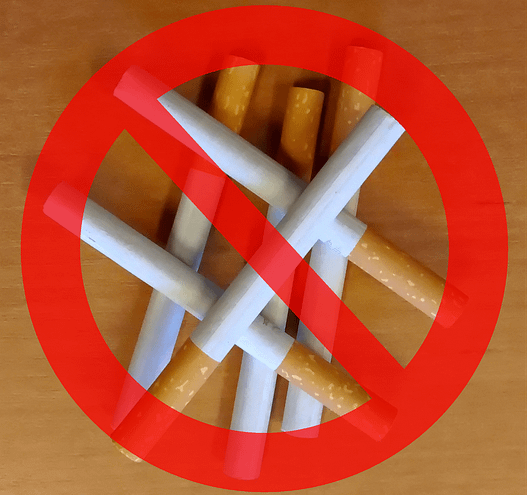I remember a gorgeous woman in her eighties who lived across from our apartment in the Chicago area. She reminded me of Marilyn Monroe. She also smoked like a chimney. On the odd chance that I went into her apartment for a couple of minutes, my clothes would be reeking of cigarette smoke. I’m not sure what initially happened, but she ended up very sick and was admitted to the hospital. Once when I visited her in the hospital, she told me that if she had known she would be so sick, she never would have smoked. I don’t know if she made it out of the hospital alive—we moved away while she was still there. Tell that story to a teenager, or someone in relatively good health who is messing with their body and they will just laugh it off! Just like she once did!

Health Effects of Smoking
Smoking is not only bad for your lungs, but it can start a cascade of adverse health conditions.
“Smoking leads to disease and disability and harms nearly every organ of the body”.
CDC (Centers for Disease Control & Prevention)

- Causes fatal diseases like emphysema, pneumonia and 90% of deaths from lung cancer
- Causes mutations in your body that lead to cancer
- 80% of deaths from COPD are due to smoking
- Causes nearly 20% of deaths in the US
- Causes stroke and coronary artery disease
- Cancer in many other parts of the body apart from the lungs
- Can damage most organs of the body, thereby affecting a person’s overall health
- Can make it harder for a woman to conceive, and affect the baby’s health before and after birth
- Can affect a man’s sperm, reducing fertility, and increasing risks for miscarriage and birth defects
- Can affect bone health
- Can affect oral health (teeth and gums)
- Can increase risks of cataracts and cause age related macular degeneration
- Can cause type II Diabetes, and make it harder to control. Smokers have a 30-40% higher risk of developing Type II DM than non-smokers
- Causes general inflammation and reduces immune function
- Can cause rheumatoid arthritis
Ok, you get it! Smoking is really bad for you and for those around you. If you are a smoker, maybe it’s time to quit. There are a host of resources out there. I am including some of the links. Smoking cessation programs are often offered for free through the human resource department in your place of employment, or through the Community health department. Whether or not you have these resources available, enlist the help and support of your family and friends to make this positive though difficult transition.
Resources for Smoking Cessation
Australia
Australian Government Department of Health
Lung Foundation Australia
1-800-654-301
Canada
Canadian Government
1-866-366-3667
Quit now Canada
1-877-455-2233
Canadian Cancer Society
1-877-513-5333
India
Quit Tobacco for Life
Give a missed call on 011-22901701
Ireland
Our Health Service
Call 1800-201-203
FREETEXT QUIT to 50100
U.K.
NHS Quit Smoking
ASH Quit Smoking Resources
0300 123 1044
U.S.
CDC how to quit smoking
CDC Quit smoking PDF
CDC basic information about smoking
American Cancer Society (Quit for Life)
866-QUIT-4-LIFE (866-784-8454); 24 hours a day, 7 days a week (except Thanksgiving, Christmas, and July 4)
American Lung Association (Lung HelpLine & Tobacco QuitLine)
800-LUNGUSA (800-586-4872)
National Cancer Institute (Smokefree.gov)
NCI’s telephone quitline: 877-44U-QUIT (877-448-7848); TTY 800-332-8615; 8 AM to 8 PM ET, Monday through Friday (English and Spanish)
LiveHelp, live online chat assistance, is available 8 AM to 11 PM ET, Monday through Friday (English only).
U.S. Department of Health and Human Services (BeTobaccoFree)Local and state: 800-QUIT-NOW (800-784-8669)
If you are a smoker, help yourself and those you love by getting help to quit now.
Share this post with someone who needs to quit and check out my post on Lungs 101.
“Journey to Health with Priya” provides general educational information on various topics on this website as a public service, which should not be construed as professional medical advice nor be used as a substitute for direct medical advice from your doctor or other qualified clinician.
I linked this post at


Great tips. I quit smoking years ago. It was not easy. I had tried before. What worked for me was hypnotism. Thank you for sharing with #omhgww.